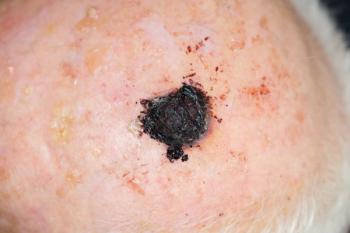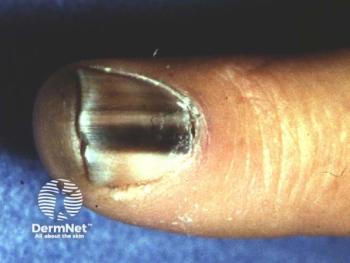
- Dermatology Times, September 2018 (Vol. 39, No. 9)
- Volume 39
- Issue 9
Skin cancer checks in psoriasis
As dermatologists become increasingly aware of comorbidities associated with psoriasis, questions of associated malignancy risk remain. Dr. Megan Noe emphasizes the need for skin cancer checks.
As dermatologists become increasingly aware of comorbidities associated with psoriasis - either from the chronic inflammatory disease itself or from systemic and other treatments - questions of associated malignancy risk remain.
“There is a lot of conflicting or confusing data in the literature about the risk of cancer in psoriasis patients,” says Megan Noe, M.D., M.P.H., instructor of dermatology at the University of Pennsylvania who spoke on this issue on July 26 at the American Academy of Dermatology Summer Sessions meeting in Chicago.
Dr. Noe says that, to date, the most consistent findings from large population-based studies suggest that patients with psoriasis are at an increased risk of non-melanoma skin cancer: basal cell carcinoma and squamous cell carcinoma. An increased risk of other types of cancers has not been well established.
But to be on the safe side, Dr. Noe recommends that all her psoriasis patients are up-to-date on all age-appropriate cancer screenings.
“I do think that all psoriasis patients - even those with well-controlled psoriasis - should have a full-body skin check once a year,” Dr. Noe says.
Skin checks can be trickier in patients with uncontrolled or poorly controlled psoriasis. Psoriasis can mimic squamous cell cancer or actinic keratoses. So, it’s important that dermatologists keep that in mind and request patients who are coming in for psoriasis visits always put on gowns for skin checks, she said.
“Especially with my patients with well-controlled psoriasis, they may not always put a gown on for every visit if they feel their skin is OK from a psoriasis standpoint,” she said.
DOES TREATMENT CAUSE CANCER?
Dermatologists might be hesitant to use biologics to treat psoriasis patients with an increased risk of cancer or who have histories of cancer. Systemic treatments are immunosuppressive and may heighten cancer risk in these patients, but that doesn’t mean to suggest these patients cannot receive biologic therapy. In these cases, Dr. Noe suggests dermatologists adhere to regular skin checks for these patients.
And, for patients with histories of other cancer types, prior malignancies do not necessarily disqualify a psoriasis patient from being a candidate for systemic therapy. But it should be prescribed with caution and collaboration, she said.
“Every case really needs to be explored on an individual basis, and it usually will include a discussion with the patient’s oncologist because it will depend on what type of cancer, how it was treated and how long ago it was diagnosed. Unfortunately, I think some dermatologists might be hesitant to even consider biologics in patients with a history of malignancy. But I think they can be considered in conjunction with the patient’s oncologist,” Dr. Noe said.
There remain gaps in the long-term data looking at many of the biologic treatments approved for psoriasis, with the exception of tumor necrosis factor (TNF) inhibitors.
“We don’t have a lot of long-term data for the newer biologics, and that’s important when you’re evaluating cancer risk. Also, these outcomes are very rare. So, you need to treat lots of people in order to really understand what’s going to happen with malignancy risk,” she says.
TNF inhibitors and traditional medications, like methotrexate, have the advantage of long-term safety data.
“We also consider things like phototherapy for psoriasis patients with a history of cancer because that doesn’t have any systemic side effects,” she says.
Overall, malignancy is something that dermatologists should think about and recommend appropriate screening to their psoriasis patients. But it’s not necessarily something that should hinder them from prescribing or patients from receiving appropriate, effective therapy, she said.
REFERENCE
“U005 - Malignancy in Patients with Psoriasis and Atopic Dermatitis: Understanding Risk and Appropriate Management,” American Academy of Dermatology Summer Sessions, Chicago. Zelma C. Chiesa-Fuxench and Megan H. Noe. 7:30 to 8:30 a.m. Thursday, July 26, 2018.
Articles in this issue
over 7 years ago
Spironolactone as effective as antibioticsover 7 years ago
Psychological stress as acne causeover 7 years ago
Technology: A private practice’s best friendover 7 years ago
Lack of standardization?over 7 years ago
Update: Immunotherapy for melanomaover 7 years ago
A new treatment for seborrheic keratosis examinedover 7 years ago
Hidradenitis suppurativa and Crohn’s disease linkover 7 years ago
Clinical trials recruiting: Molluscum contagiousumover 7 years ago
Psoriasis lotion seeks FDA approvalNewsletter
Like what you’re reading? Subscribe to Dermatology Times for weekly updates on therapies, innovations, and real-world practice tips.

















